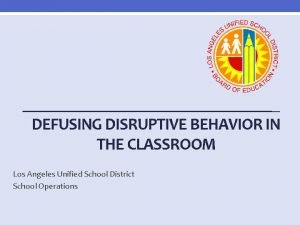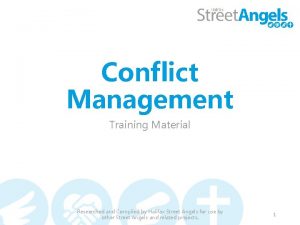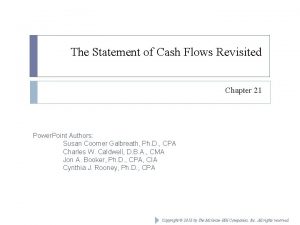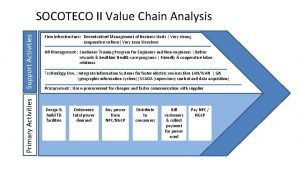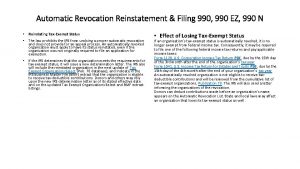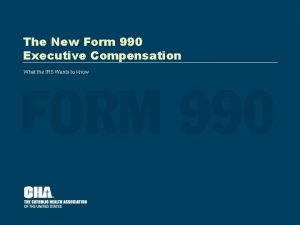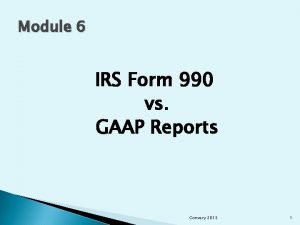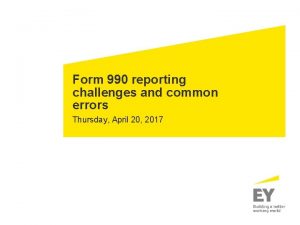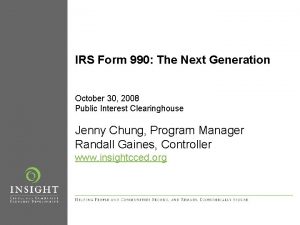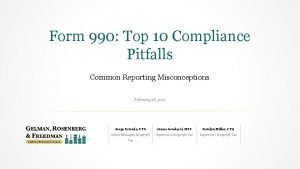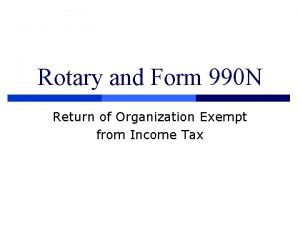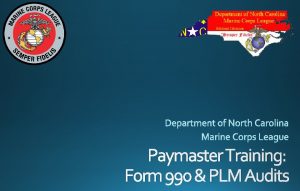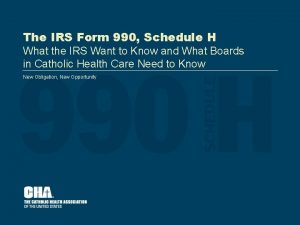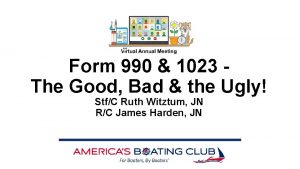The New Form 990 Defusing Governance Political Activities




























![Policies Whistleblower (Line 13) An acceptable policy “[e]ncourages staff and volunteers to come forward Policies Whistleblower (Line 13) An acceptable policy “[e]ncourages staff and volunteers to come forward](https://slidetodoc.com/presentation_image_h2/b0a16442b8b6c0e9e7984ac05d326559/image-29.jpg)

![Policies Document Retention (Line 14) An acceptable policy specifies the “[r]ecord retention responsibilities of Policies Document Retention (Line 14) An acceptable policy specifies the “[r]ecord retention responsibilities of](https://slidetodoc.com/presentation_image_h2/b0a16442b8b6c0e9e7984ac05d326559/image-31.jpg)






- Slides: 37

The New Form 990: Defusing Governance, Political Activities, Compensation, and Other Issues JEFFREY S. TENENBAUM RONALD M. JACOBS AARON H. HILLER DECEMBER 4, 2008 © 2008 Venable LLP 1

The New Form 990 Political Issues and Governance Schedule C – Political Activities – Lobbying Activities Part VI of the Core Form – Governance – Policies © 2008 Venable LLP 2

Concept for the New 990 and Schedules IRS Guiding Principles Enhance transparency to provide the IRS and the public with a realistic picture of the organization, along with the basis for comparison to other organizations Promote compliance by accurately reflecting the organization’s operations so the IRS may efficiently assess the risk of noncompliance Minimize the burden on filing organizations © 2008 Venable LLP 3

Format of Redesigned Form Core form, including summary page 16 schedules with applicability based on organization’s specific indicators For complete set of Form 990 and final instructions, go to www. irs. gov/charities/article/0, , id=185561, 00. html © 2008 Venable LLP 4

the road ahead. C for Schedule ABC Activities CORPORATION Political and Lobbying © 2008 Venable LLP 5

Schedule C Three Areas of Disclosure Section I – Political Activities • Expenses • Volunteer Time Section II – Lobbying Activities for 501(c)(3) Organizations Section III – Lobbying Activities and Proxy Tax for Other 501(c) Organizations © 2008 Venable LLP 6

Section I Political Campaign Activities – All activities that support or oppose candidates for elective federal, state or local public office. It does not matter whether the candidate is elected. A candidate is one who offers himself or is proposed by others for the public office. – Political campaign activity does not include any activity to encourage participation in the electoral process, such as voter registration or voter education, provided that the activity does not directly or indirectly support or oppose any candidate. © 2008 Venable LLP 7

Section I-A 501(c) and 527 Groups Narrative description of direct and indirect political campaign activities Amount of political expenditures – Any expenditure for political campaign activities are political expenditures. An expenditure includes a payment, distribution, loan, advance, deposit, or gift of money, or anything of value. It also includes a contract, promise, or agreement to make an expenditure, whether or not legally enforceable. – Key Points: – 501(c)(3) should not have political expenditures – Other organizations could trigger tax consequences Volunteer hours © 2008 Venable LLP 8

Section I-B 501(c)(3) Organizations Amount of any excise tax paid Amount of excise tax incurred Did the organization file Form 4720 © 2008 Venable LLP 9

Section I-C 501(c) (other than (c)(3)) Amount of direct expenses for 527 exempt function – All functions that influence or attempt to influence the selection, nomination, election, or appointment of any individual to any Federal, State, or local public office or office in a political organization, or the election of Presidential or Vice-Presidential electors, whether or not such individual or electors are selected, nominated, elected, or appointed Amount of internal funds contributed to other organizations for political activity – Not PAC contributions – Again, could have tax consequences Identification of all 527 organizations to which funds were given – Includes transfers to PAC (e. g. , combined dues/contribution payment © 2008 Venable LLP 10

Section II 501(h) Election Versus No 501(h) Election Lobbying in the tax code is not clearly defined Only test for excessive lobbying is if lobbying is “substantial part” of organization’s activities 501(h) provides clear definitions of lobbying, but sets caps © 2008 Venable LLP 11

Section II-A 501(c) (3) Making 501(h) Election Fairly straightforward application of 501(h) Information – Grass roots lobbying expenditures – Direct lobbying expenditures – Total lobbying – Exempt purpose expenditures – Total of exempt purpose and lobbying – Tax amount 4 -Year Average Amount reported on 1 c would be used as basis for LDA number, if using Method B © 2008 Venable LLP 12

Section II-B 501(c) (3) Not Making 501(h) Election Series of questions designed to determine whether lobbying was “substantial” Same as old 990 No requirement to describe activities (was required on old 990) Yes/No questions and amounts expended Section asking to confess to engaging in “substantial” lobbying © 2008 Venable LLP 13

Section III Nondeductibility and the Proxy Tax Applies to 501(c)(4), (5), and (6) organizations Amount spent on lobbying is either: – Not deductible by members – Subject to a proxy tax Section 162(e) – the nondeductibility/proxy tax section of the Code – provides Method C for the LDA Definition of lobbying in 162(e) is different than 501(h) definition © 2008 Venable LLP 14

Section III 162(e) Lobbying includes: – Influencing legislation – Influencing actions of covered officials Methods of Calculation – Reasonable methods acceptable – Specific methods from IRS regulations © 2008 Venable LLP 15

Section III-A 501(c) (4), (5), (6) Organizations – Screening Questions Same set of questions from old 990 Were substantially all dues received nondeductible by members – New form uses 90% – Old form did not have a percentage for “substantially all” Did the organization make only in-house lobbying expenditures of $2, 000 or less Did the organization agree to carryover lobbying and political expenditures from the prior year © 2008 Venable LLP 16

Section III-B 501(c) (4), (5), (6) Organizations (in certain circumstances) Used if answered “Yes” to: – Did the organization agree to carryover lobbying and political expenditures from the prior year Or answered “No” to both: – Were substantially all dues received nondeductible by members – Did the organization make only in-house lobbying expenditures of $2, 000 or less © 2008 Venable LLP 17

Section III-B If required by III-A Report information about dues, lobbying, and nondeductibility – similar to old 990 questions: – Dues, assessments, and similar amounts – Section 162(e) non-deductible expenditures • Lobbying and political • But not political activity for which taxes were paid under section 527(f) – Carryover from prior year – Total – Aggregate amount reported as nondeductible on dues notices © 2008 Venable LLP 18

Section III-B Tax Calculations Determine Excess: – If total exceeds amount from dues notices, how much will be carried forward to next year? – Amount not carried forward and subject to taxation © 2008 Venable LLP 19

the road ahead Part VI for ABC CORPORATION Governance, Management & Disclosure © 2008 Venable LLP 20

Introduction to Part VI Rationale Departure from typical tax form questions. IRS rationale: an independent board of directors and well-defined governance and management policies increase likelihood of tax compliance, safeguarding of charitable assets, and serving of charitable interests. Self-regulation and internal controls. Transparency and accountability. © 2008 Venable LLP 21

Questions About Board & Management Independent Board Number of independent voting members of the board of directors? (Line 1) Independence Defined: – Not compensated as an officer or employee by association or related organization (Schedule R); – Not compensated as independent contractor in excess of $10, 000, except for reasonable compensation for services provided; and – Not involved, and no family member involved, in a financial transaction with the association (Schedule L). – Do not lose independence because of charitable donation or member benefits. – Required to put up reasonable effort to obtain information necessary to determine independence, and may rely on the responses provided. © 2008 Venable LLP 22

Questions About Board & Management Other Questions Family relationships and business relationships among officers, directors, trustees, and key employees? Again, reasonable effort. (Line 2) Delegation of key responsibilities to a management company? (Line 3) Significant changes to your organizational documents? (Line 4) Do members elect or appoint members of the governing body? (Line 7 a & Schedule O) Do members approve decisions of the governing body? (Line 7 b & Schedule O) © 2008 Venable LLP 23

Questions About Board & Management Other Questions (Continued) Do you document decisions taken in board meetings? Committee meetings? (Line 8) Does the governing body have an opportunity to review the Form 990? What is the process for review? (Line 10) Use Schedule O A “yes” or “no” answer is rarely enough! © 2008 Venable LLP 24

Questions About Policies Needed Do you have all of these policies in place? – – – Conflict of Interest Policy Whistleblower Policy Document Retention and Destruction Policy Compensation Policy Joint Venture Policy Written policies Enforcement of policies © 2008 Venable LLP 25

Policies Conflict of Interest (Line 12) Acceptable policy: – “defines conflicts of interest, identifies the classes of individuals within the organization covered by the policy, facilitates disclosure of information that may help identify conflicts of interest, and specifies procedures to be followed in managing conflicts of interest. ” “A ‘conflict of interest’ arises when a person in a position of authority…may benefit financially from a decision he or she could make in such capacity. ” © 2008 Venable LLP 26

Policies Conflict of Interest (Continued) Conflict Defined: – “For this purpose, a conflict of interest does not include questions involving a person’s competing or respective duties to the organization and to another organization, such as by serving on the boards of both organizations, that do not involve a material financial interest of, or benefit to, such person. ” Annual disclosure of potential conflicts? The bare minimum—of course “conflict of interest” means more! © 2008 Venable LLP 27

Policies Conflict of Interest (Continued) Ongoing monitoring and enforcement of the policy? Often worse to have the policy and not enforce it than to not have the policy at all! © 2008 Venable LLP 28
![Policies Whistleblower Line 13 An acceptable policy encourages staff and volunteers to come forward Policies Whistleblower (Line 13) An acceptable policy “[e]ncourages staff and volunteers to come forward](https://slidetodoc.com/presentation_image_h2/b0a16442b8b6c0e9e7984ac05d326559/image-29.jpg)
Policies Whistleblower (Line 13) An acceptable policy “[e]ncourages staff and volunteers to come forward with credible information on illegal practices or violations of adopted policies of the organization. ” “Specifies that the organization will protect the individual from retaliation. ” “Identifies those staff or board members or outside parties to whom such information can be reported. ” © 2008 Venable LLP 29

Policies Whistleblower (Continued) Sarbanes-Oxley: a federal crime to retaliate against whistleblowers who report to federal law enforcement authorities Broad enough to cover legal questions and association policy © 2008 Venable LLP 30
![Policies Document Retention Line 14 An acceptable policy specifies the record retention responsibilities of Policies Document Retention (Line 14) An acceptable policy specifies the “[r]ecord retention responsibilities of](https://slidetodoc.com/presentation_image_h2/b0a16442b8b6c0e9e7984ac05d326559/image-31.jpg)
Policies Document Retention (Line 14) An acceptable policy specifies the “[r]ecord retention responsibilities of staff, volunteers, board members, and outsiders for maintaining and documenting storage and destruction of the organization’s documents and records. ” Tailor specifically to your activities. Seek advice of counsel—requirements vary from jurisdiction to jurisdiction. © 2008 Venable LLP 31

Policies Compensation (Line 15) 2008 Form 990 requires all tax-exempt entities (not just 501(c)(3)’s) to report five highest paid employees. Rebuttable presumption procedure from IRC 4958 and best practices: – Formal approval by board or compensation committee. – Comparability data. – Timely documentation of the decision. © 2008 Venable LLP 32

Policies Joint Venture (Line 16) Basic set of principals. Every joint venture should be governed by a written agreement, reviewed by counsel, and designed to protect your tax-exempt status. © 2008 Venable LLP 33

Policies Other Issues Are the policies legally required? This point clarified on Form 990 itself. Presumption of wrongdoing, however, if not in place? Best practices, gather the information you need. © 2008 Venable LLP 34

Next Steps Dry run of new Form 990 Perform gap analysis regarding policies Establish compensation approval procedures Determine if new bookkeeping required Select Form 990 team © 2008 Venable LLP 35

Contact Information YOUR VENABLE TEAM Jeffrey S. Tenenbaum jstenenbaum@venable. com t 202. 344. 8138 f 202. 344. 8300 Ronald M. Jacobs rmjacobs@venable. com t 202. 344. 8215 f 202. 344. 8300 Aaron H. Hiller ahhiller@venable. com t 202. 344. 8289 f 202. 344. 8300 www. Venable. com © 2008 Venable LLP 36

the for Theroad Newahead Form 990 CORPORATION Defusing. ABC Governance, Political Activities Compensation, and Other Issues © 2008 Venable LLP 37
 Defusing disruptive behavior in the classroom
Defusing disruptive behavior in the classroom Defusing vaiheet
Defusing vaiheet Defusing dog
Defusing dog What does palms stand for in conflict resolution
What does palms stand for in conflict resolution Shrm 990
Shrm 990 Political system and governance before spanish colonization
Political system and governance before spanish colonization Political practices activities examples
Political practices activities examples Operating activities vs investing activities
Operating activities vs investing activities Group these activities into indoor and outdoor activities
Group these activities into indoor and outdoor activities Support activities and primary activities
Support activities and primary activities Primary activities definition
Primary activities definition Develop new approaches to public governance and engagement
Develop new approaches to public governance and engagement Vendorism
Vendorism Corporate governance is a form of
Corporate governance is a form of New frontier definition
New frontier definition Tennessee valley authority political cartoons
Tennessee valley authority political cartoons Dust bowl migration map
Dust bowl migration map Political lists new
Political lists new Political wish new
Political wish new Did the congress of vienna succeed
Did the congress of vienna succeed Present continuous affirmative form
Present continuous affirmative form Hát kết hợp bộ gõ cơ thể
Hát kết hợp bộ gõ cơ thể Frameset trong html5
Frameset trong html5 Bổ thể
Bổ thể Tỉ lệ cơ thể trẻ em
Tỉ lệ cơ thể trẻ em Chó sói
Chó sói Thang điểm glasgow
Thang điểm glasgow Bài hát chúa yêu trần thế alleluia
Bài hát chúa yêu trần thế alleluia Kể tên các môn thể thao
Kể tên các môn thể thao Thế nào là hệ số cao nhất
Thế nào là hệ số cao nhất Các châu lục và đại dương trên thế giới
Các châu lục và đại dương trên thế giới Công thức tính thế năng
Công thức tính thế năng Trời xanh đây là của chúng ta thể thơ
Trời xanh đây là của chúng ta thể thơ Mật thư anh em như thể tay chân
Mật thư anh em như thể tay chân Làm thế nào để 102-1=99
Làm thế nào để 102-1=99 độ dài liên kết
độ dài liên kết Các châu lục và đại dương trên thế giới
Các châu lục và đại dương trên thế giới Thơ thất ngôn tứ tuyệt đường luật
Thơ thất ngôn tứ tuyệt đường luật
